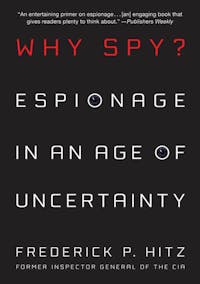Why Spy?
Espionage in an Age of Uncertainty
 Download image
Download image
ISBN10: 0312561733
ISBN13: 9780312561734
Trade Paperback
224 Pages
$19.99
CA$21.99
Drawing on over twenty-five years of experience, Frederick P. Hitz, a former inspector general of the Central Intelligence Agency, guides the reader through the byzantine structure of the U.S. intelligence community (which agency handles what?), traces the careers and pitfalls of such infamous spies as Robert Hanssen and Aldrich Ames, and explains how the United States must meet the challenges set forth in the Intelligence Reform and Terrorism Prevention Act of 2004. He also describes the transformation of the CIA after the end of the Cold War—from 1991 to the present—and outlines a vision for the future of U.S. spying in the twenty-first century.
Reviews
Praise for Why Spy?
"A useful primer on the new (and greater) challenges to intelligence collection and analysis so different from those of the Cold War. Hitz outlines why the classic motives for recruitment of spies have weakened—even as we become more dependent on good intelligence in coping with the threat of terrorism. As a onetime inspector general at the CIA, he presents his own view regarding the restraints he feels should be imposed on intelligence operations."—James R. Schlesinger, former Director of Central Intelligence and Secretary of Defense and of Energy
"Nice Americans do not like human espionage. In this book Frederick P. Hitz has done a great job of rationally explaining the not nice, morally ambiguous, ‘dirty' business of espionage. This is a service to the country at a time when there has never been a greater need for secret, human-source intelligence—which can only be obtained with the full understanding and support of the American people."—Paul J. Redmond, former head of CIA Counterintelligence
"The CIA's former inspector general details the extensive use of espionage and intelligence by the U.S. government since World War II. Hitz divides the book into four sections concerning every possible aspect of spying: the motivations to do so, the tactics employed by various organizations, the state of spying in the 21st century and the ethical considerations it provokes. He provides a revealing glimpse into a world often romanticized by modern cinema and literature—and yes, readers will find real-life double agents, pricey sex scandals and even ‘a James Bond-like escape from FBI surveillance.' However, Hitz appears pessimistic when tackling the current state of counterintelligence operations both in the United States and around the world. The new enemy is not a foreign government, he notes, but a worldwide network of terrorist cells that operate at their own behest. While Osama bin Laden may be the figurehead, these cells are independent, which makes them extremely hard to locate and infiltrate. Age-old tactics such as sexual exploitation and torture procedures like those used at Abu Ghraib or Guantanamo Bay are no longer as effective as in the past; the author claims that Islamic prisoners are less susceptible to such techniques due to their fundamentalist beliefs. The very concept of spying is rapidly taking a new identity, he writes, with the Internet now considered the main conduit for information flow between terror cells and their members. The days of shrouded secrecy and privileged information on the day-to-day protection and operation of the United States are coming to an end. Hitz argues that the public and local police services are now required to stand guard should the nation wish to avoid the next 9/11."—Kirkus Reviews
"Hitz, a former CIA inspector general, writes an entertaining primer on espionage: why it worked against the U.S.S.R. but flopped against terrorists, and what America can do about it. He starts with a delicious account of the seven reasons people spy. Ideology and money lead the list, although experts maintain that no one ever turned traitor for purely ideological reasons. Simple revenge for being fired or denied promotion play a role, and Robert Hanssen (portrayed in the recent movie Breach) so desperately wanted to prove he could amount to something, he turned double agent. Despite plenty of fiascoes, Hitz argues that spying produced much valuable information during the Cold War but little afterwards, due to the difficulties of obtaining human intelligence from terrorist cells and secretive groups like al-Qaeda. The U.S. now depends on the intelligence services of countries like Pakistan and Saudi Arabia, whose goals often contradict ours, and Hitz claims the Bush administration clearly prefers intelligence that supports its policies. His solutions include government support for studying languages, greater professionalism, relieving the political pressure on analysts, and streamlining the lugubrious bureaucracy. Although Hitz warns that reform will take a while, he delivers this news in a short, engaging book that gives readers plenty to think about."—Publishers Weekly
Reviews from Goodreads
BOOK EXCERPTS
Read an Excerpt
Why Spy?
Part One
The Seven Motivations for Espionage
Chapter One
Espionage versus Intelligence: How the United States Goes About Spying
Before discussing in detail why spies choose...



